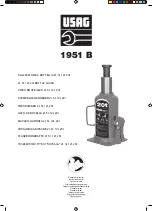
InstructIons for:
TROLLEY JACK
pREmiER LOng REACh
Your new jack is produced and manufactured to a high standard of dependability and will, if used according to these instructions and properly
maintained, give you years of trouble free performance
.
Important:
REAd ThEsE insTRuCTiOns CAREfuLLY. nOTE ThE sAfE OpERATiOnAL REQuiREmEnTs, WARnings And CAuTiOns.
usE This JACK CORRECTLY And WiTh CARE fOR ThE puRpOsE fOR WhiCh iT is inTEndEd. fAiLuRE TO dO sO mAY CAusE dAmAgE
And/OR pERsOnAL inJuRY And WiLL invALidATE ThE WARRAnTY. RETAin ThEsE insTRuCTiOns fOR fuTuRE usE.
model: ...........................................................................................TJ3
capacity.........................................................................................3ton
Min. saddle height ...................................................................140mm
Max. saddle height ..................................................................506mm
Max. chassis height ..................................................................170mm
Length.....................................................................................1170mm
Weight ..........................................................................................50kg
Model no
: TJ3.v3
tJ3.V3 Issue no: 1 - 02/04/08
Ensure the jack is in sound condition and good working order.
take action for immediate repair or replacement of damaged parts.
Use genuine parts only. The use of improper parts may be
dangerous and will invalidate the warranty.
Locate the jack in a suitable, well lit work area.
Keep work area clean and tidy and free from unrelated materials.
use jack on level and solid ground, preferably concrete.
Avoid
tarmacadam as jack may sink in
.
Place wedges under wheels of vehicle (
but ensure that wheels of
jack can freely move).
Ensure the vehicle handbrake is engaged, engine is switched off
and transmission is in gear (or “Park” if automatic).
Ensure minimum distance of 0.5mtr between vehicle and static
objects such as doors, walls etc., to allow for vehicle tilting.
Ensure there are no passengers in the vehicle.
Ensure all non-essential persons keep a safe distance whilst the
jack is in use.
only place jack under those lifting points recommended by vehicle
manufacturer
(see vehicle handbook).
check the lifting point is stable and centred on the jack saddle.
Ensure the jack wheels are free to move and that there are no
obstructions.
DanGEr!
Use the jack for lifting only, NOT for supporting the
lifted load.
use suitable capacity axle stands under the vehicle before
proceeding with any task.
Ensure that there are no persons or obstructions beneath the
vehicle before lowering.
use a qualified person to maintain or repair the jack’s hydraulic
system.
dO nOT
operate the jack if damaged.
dO nOT
allow untrained persons to operate the jack.
dO nOT
exceed the rated capacity of the jack.
dO nOT
allow the vehicle to move while supported by the jack, or
use the jack to move the vehicle.
dO nOT
jack the vehicle if there is a risk of spillage of fuel, battery
acid, or other dangerous substances.
dO nOT
work under the vehicle until axle stands have been
correctly positioned.
dO nOT
use the jack for purposes other than that for which it is
intended.
dO nOT
top up the hydraulic system with brake fluid. use
hydraulic jack oil only.
dO nOT
adjust the safety overload valve.
When not in use store jack, fully lowered, in a safe, dry, childproof
area.
WARning!
It is
very dangerous
to go under a vehicle which is
supported by a jack
even
if additional supports are used.
Do not
go under a vehicle unless it is supported by adequately rated axle
stands.
impORTAnT! Ensure that you can see the saddle and
jacking point throughout the jacking operation in case
there is any relative movement.
WARning: The warnings, cautions and instructions discussed
in this instruction manual cannot cover all possible
conditions and situations that may occur. it must be under
stood that common sense and caution are factors which
cannot be built into this product, but must be applied by the
operator.
3. bEfORE usE
3.1 Assemble the handle.
Insert the handle into the socket and fix it with the screw provided.
3.2 check oil level.
3.2.1 Ensure the jack is resting on level ground and that the ram is
fully retracted. Hold open the release valve for 10 seconds by
lifting and turning the handle clockwise.
3.2.2 remove the access plate from the top of the jack. Identify the
filler plug in the top surface of the main barrel and remove it.
the oil level should be level with the bottom of the filler hole.
3.2.3 If necessary, top up with hydraulic oil. use only sealey
hydraulic jack oil (see your authorised sealey dealer).
3.3 Purge the hydraulic system. Pull the handle up, turn it
clockwise and whilst held in this position pump the handle up
and down 10 to 15 times to ensure internal lubrication and
bleed accumulated air from the system.
3.3.1 When the handle is released it will automatically return to its
original position.
3.3.2 refit the filler plug and the top access plate. the jack is now
ready for use.
2. spECifiCATiOn
1. sAfETY pRECAuTiOns
4.1
Lifting
(Do not attempt to lift a vehicle which is heavier than
the rating of the jack).
nOTE:
the jack is fitted with an overload valve which is factory set
and under no circumstances must it tampered with. If the
nominal capacity of the jack is exceeded the overload valve will
prevent further lifting.
4.1.1 Before raising a vehicle ensure the hand brake is on and
chock the vehicle wheels.
4.1.2 Jacking operations should only be carried out on solid ground
such as concrete. the jacking area should be free from
spillages and debris.
4.1.3 Pump the handle up and down through its full stroke to raise
the lifting arm close to the jacking point.
4.1.4 Alternatively use the foot pedal to rapidly raise the saddle to
the point of load contact.
4.1.5 Position the lifting saddle of the jack under one of the vehicles
specified lifting points (check vehicle manufacturer’s
recommendations).
4.1.6 Ensuring that the point of load contact is stable, continue
pumping the handle up and down through its full stroke to raise
the vehicle to the desired height.
4. OpERATiOn




















